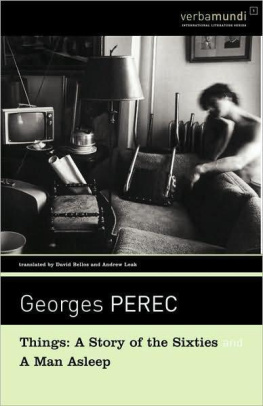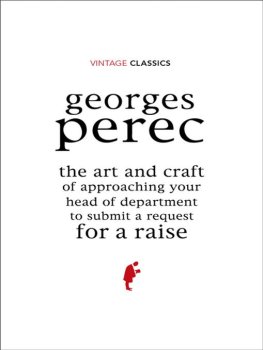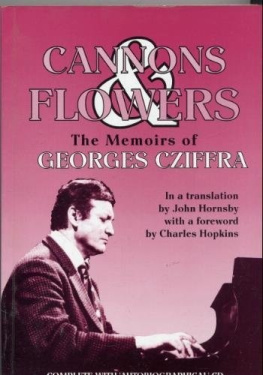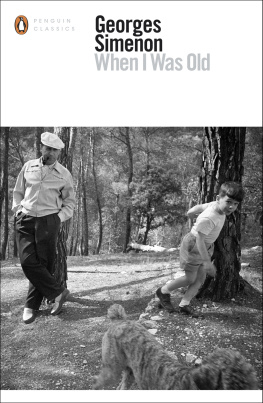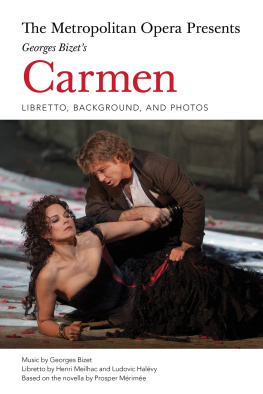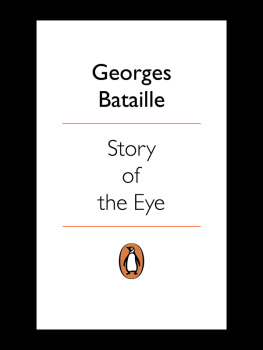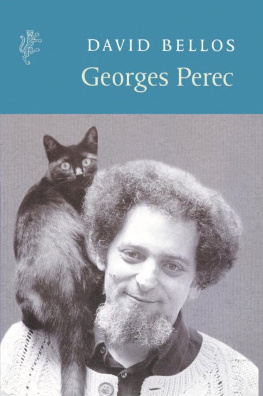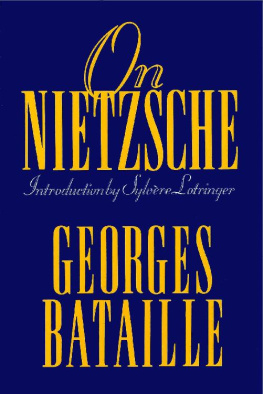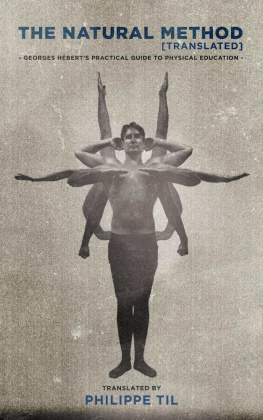Georges Perec - Things: A Story of the Sixties; A Man Asleep
Here you can read online Georges Perec - Things: A Story of the Sixties; A Man Asleep full text of the book (entire story) in english for free. Download pdf and epub, get meaning, cover and reviews about this ebook. year: 0, genre: Art / Science fiction. Description of the work, (preface) as well as reviews are available. Best literature library LitArk.com created for fans of good reading and offers a wide selection of genres:
Romance novel
Science fiction
Adventure
Detective
Science
History
Home and family
Prose
Art
Politics
Computer
Non-fiction
Religion
Business
Children
Humor
Choose a favorite category and find really read worthwhile books. Enjoy immersion in the world of imagination, feel the emotions of the characters or learn something new for yourself, make an fascinating discovery.
- Book:Things: A Story of the Sixties; A Man Asleep
- Author:
- Genre:
- Year:0
- Rating:4 / 5
- Favourites:Add to favourites
- Your mark:
- 80
- 1
- 2
- 3
- 4
- 5
Things: A Story of the Sixties; A Man Asleep: summary, description and annotation
We offer to read an annotation, description, summary or preface (depends on what the author of the book "Things: A Story of the Sixties; A Man Asleep" wrote himself). If you haven't found the necessary information about the book — write in the comments, we will try to find it.
Things: A Story of the Sixties; A Man Asleep — read online for free the complete book (whole text) full work
Below is the text of the book, divided by pages. System saving the place of the last page read, allows you to conveniently read the book "Things: A Story of the Sixties; A Man Asleep" online for free, without having to search again every time where you left off. Put a bookmark, and you can go to the page where you finished reading at any time.
Font size:
Interval:
Bookmark:
Georges Perec
THINGS
A STORY OF THE SIXTIES
Translated from the French by David Bellos
A MAN ASLEEP
Translated from the French by Andrew Leak
WITH AN INTRODUCTION BY DAVID BELLOS
Perec, Georges, 1936-1982 Things: a story of the sixties, with, A man asleep.
THINGS. A STORY OF THE SIXTIES first published in France with the title Les Choses by Editions Julliard, 1965
A MAN ASLEEP first published in France with the title Un homme qui dort by Editions Denol, 1967
First published in Great Britain by Collins Harvill, 1990 Les Choses Ren Julliard 1965 Un homme qui dort Editions Denol 1967 English translations and Introduction William Collins Sons & Co. Ltd 1990
CONTENTS
INTRODUCTION
G EORGES P EREC was born in Paris in 1936, and his memories of early childhood and of the war years, some of which he spent as a refugee in the French Alps, are recorded in chapters of W or The Memory of Childhood (1975). He was educated in Paris and at a state boarding school at Etampes, then at the Lyce Henri-IV and the Sorbonne, where he followed courses in history and sociology for two years without much enthusiasm. He did two years' military service in a parachute regiment but was exempted from active service in Algeria. After a year spent in Sfax (Tunisia) and a short period working as a market researcher, Perec obtained a post of archivist in a medical research laboratory in Paris in 1962, and he remained employed in the same capacity until 1979. He died in March 1982 after a short illness.
Perec decided to be a writer before he was twenty, but, for nearly ten years, apart from a few book reviews and essays on literature and film, he published nothing. Things. A Story of the Sixties was his first book and it made him famous almost instantly. A Man Asleep followed just over a year later, but created much less of a stir. These two short novels are published here in English together because, more than any other of Perec's numerous and very diverse writings, they shed light on each other, represent the two different sides of something like the same coin.
Things. A Story of the Sixties was begun in 1962 under the title "The Great Adventure" but did not reach its final form until 1964. It was published in September 1965 as Les Choses. Une histoire des annes soixante , in the "Lettres nouvelles" collection edited by Maurice Nadeau for Julliard, and was an immediate success, selling far more copies than first novels by unknown authors usually do. The award of the Renaudot prize, some two months later, confirmed, rather than created, the perception of Things as the story of a whole generation. By the end of the 1960s, it had been translated into most European languages and had found its place on French literature syllabuses throughout the world. Student editions in French were published both in Moscow and in New York; it has since also become a set text in French secondary schools.
As is often the case with works of European literature, Things fared less well in the English-speaking world than almost anywhere else. It was at least translated (by Helen Lane) in the 1960s, but the Grove Press edition (now a bibliographic rarity) was hardly reviewed at all and was never even issued in Britain. The text published here is an entirely new translation.
Superficially, both Things. A Story of the Sixties and A Man Asleep bear a family resemblance to the kind of avant-garde fiction which was, by the mid-sixties, no longer quite as new as the term "new novel" suggested. Neither of Perec's books has a strong narrative structure; neither has strongly delineated characters. But the use Perec made of what now looks like a period style is very different from the fiction of Alain Robbe-Grillet or Michel Butor, and opens a new and far more accessible chapter in the history of the novel.
Things aims to exhaust all that can be said about fascination , and, more particularly, to explore what words like happiness and freedom can mean in the modern world - the world of consumerism as it was emerging in the France of de Gaulle. A Man Asleep is a similarly exhaustive exploration of its opposite, indifference. Both novels seem to arise from the banal but no less poignant contradiction between feelings of being and not being in the world.
Both these novels were written before Perec had any contact with the Ouvroir de littrature potentielle, or OuLiPo - indeed, before OuLiPo was known outside of a tiny circle. Although they are not generated by formal mechanisms of the kind used for Life A User's Manual , they are nonetheless highly crafted, constructed texts. Things, Perec said in a lecture at the University of Warwick, was written to fill the blank space created, so to speak, by the juxtaposition of four works of importance to him: Roland Barthes' Mythologies ; Flaubert's Sentimental Education ; Paul Nizan's La Conspiration ; and a striking account of life in the concentration camps, Robert Antelme's L'Espce humaine. A Man Asleep (its title taken from Proust's Remembrance of Things Past) is constructed more literally from its six progenitory models; Kafka, Melville, Lowry, Proust, Le Clzio, Joyce.
Things. A Story of the Sixties was read, in the 1960s, as a sociological novel, and, very often, as a denunciation of consumer capitalism. That is no doubt why it was so rapidly translated into all the languages of Eastern Europe. For Perec, however, it was not that at all, any more than it was a celebration of its characters' fascination with material wealth. Its main idea, he said, was to explore the way "the language of advertising is reflected in us", whilst describing simply, "in barely heightened terms", the particular social world which happened to be his. The result is a masterpiece of detachment and ambiguity, with an ending that is "neither positive nor negative; you finish on ambiguity; to my mind, it's a happy ending and also the saddest ending you could possibly imagine...." Through his use of a shifting narrator, who is neither "above" his characters looking down on them, as in a traditional novel, nor "inside" them, as in more modern "stream of consciousness" writing, Perec is reaching towards the kind of simultaneous passion and detachment characteristic of Flaubert, and he achieves a mixture of understated affection and discreet irony close to the tone of many of the tales to be told a decade later in Life A User's Manual.
A Man Asleep , published in 1967 under the title Un Homme qui dort , deals with a depression so extreme as to verge on self-annihilation. The experience is one which Perec says he went through himself around the age of twenty. It is a subject to which he returned, through self-quotation and adaptation, first in the film version of A Man Asleep, released in 1974, and then in 1978, in chapter fifty-two of Life A User's Manual. In this last variant, the character is given a name, Grgoire Simpson echoing Kafka's Gregor Samsa (in The Metamorphosis ), who wakes one morning to find life intolerable in a different way - and he seems to end up throwing himself off a railway bridge. That is no reason for believing that A Man Asleep also ends in bleak despair. It ends at Place Clichy, in the rain, waiting for it to stop. A step has been taken towards "waking up" from the sleep of indifference, but there is no guarantee that any number of further steps will take you out of hell, or back into the world of living. Perec's novel brings you only to the brink of carrying on. Like Things , and as if to mirror it, A Man Asleep ends on an ambiguity which is both moral and literary. Perec not only allows, but obliges his reader to take responsibility for the meaning of the work.
A Man Asleep is a second-person novel. English has no equivalent for the singular, tu form of the second person pronoun in French, used by Perec throughout the text. Whereas vous is the (plural) polite and formal way of saying "you" in French (and is the form used, for example, in Michel Butor's second-person narrative of a train journey, La Modification ), the tu form is familiar, friendly, but also (in some circumstances) aggressive. What is also not clear, in the French as in the English, is who, in A Man Asleep, is saying tu to whom.
Next pageFont size:
Interval:
Bookmark:
Similar books «Things: A Story of the Sixties; A Man Asleep»
Look at similar books to Things: A Story of the Sixties; A Man Asleep. We have selected literature similar in name and meaning in the hope of providing readers with more options to find new, interesting, not yet read works.
Discussion, reviews of the book Things: A Story of the Sixties; A Man Asleep and just readers' own opinions. Leave your comments, write what you think about the work, its meaning or the main characters. Specify what exactly you liked and what you didn't like, and why you think so.

